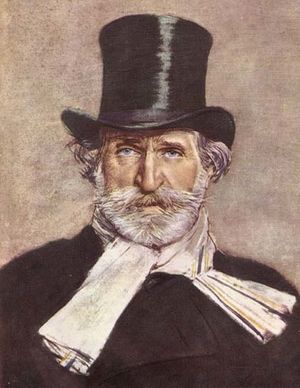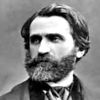أتيلا (اوپرا)
| جوسپه ڤردي |
|---|
 |
أتيلا هي اوپرا من ثلاثة فصول لجوسپه ڤردي، وكتبها الليبرتو الإيطالي تميستوكله سولرا، مقتبسة من مسرحية أتيلا، ملك الهون لزكارياس ڤرنر. في البداية، كلف ڤردي فرانشسكو ماريا پياڤه بكتابة نص الاوپرا التي كتب ڤردي السيناريو الخاص بها. بعد أن شعر پياڤه أن العمل غير مرضي، اتجها ڤردي إلى سولرا، لكنه استعان بپياڤه في الفصل الثالث.[1] عرضت الاوپرا لأول مرة في لا فينيس، البندقية، في 17 مارس 1846.
. . . . . . . . . . . . . . . . . . . . . . . . . . . . . . . . . . . . . . . . . . . . . . . . . . . . . . . . . . . . . . . . . . . . . . . . . . . . . . . . . . . . . . . . . . . . . . . . . . . . . . . . . . . . . . . . . . . . . . . . . . . . . . . . . . . . . . . . . . . . . . . . . . . . . . . . . . . . . . . . . . . . . . . .
تاريخ العرض
بعد عرضها عالمياً عام 1846 في لا فنيسيه في البندقية، عرضت لأول مرة في لندن في مسرح جلالتها عام 1848، بطولة صوفي كروڤللي، إيطالو گاردوني، ڤللتي، كروزوني وفي مدينة نيويورك عام 1859. في القرن العشرين، أعيد عرضها أثناء مهرجان البندقية عام 1951 بطولة مانشيني، پنو، جيانگياكومو، گيلفي، وإيطالو تاجو، بقيادة المايسترو كارلو ماريا جيليني؛ وفي ساكلدر ويلز بلندن عام 1963 (باللغة الإنجليزية)، مع راي وودلاند، دونالد سميث، موسفيلد، ودونالد ماك إنتريه، والمايسترو موير ماثيسون. عرضت الاوپرا في العام التالي في روما، ثم عرضت في ترييسته عام 1965، في بوينس آيرس عام 1966، برلين 1971.
في 21 ديسمبر 1980، عرضت في اوپرا ڤينا، تحت قيادة المايسترو جوسپه سينوپولي، وبطولة جيليو شازالتس.
الأدوار
| الدور | نوع الصوت | العرض الأول، 17 مارس 1846[2] (المايسترو: - ) |
|---|---|---|
| أتيلا، ملك الهان | باس | إگانزيو ماريني |
| ألدينو، بريتون عبد عطيل | تينور | إتوره پروفيلي |
| أودبلا، ابنة لورد أكيليا | سوپرانو | صوفي ليويه |
| إيزيو، جنرال روماني | باريتون | نتالي قسطنطيني |
| فورستو، فارس أكيليا | تينور | كارلو گاسكو |
| ليون (البابا ليو الأول)[3] | باس | جوسپه رومانيلي |
| قادة، ملوك، جنود الهان، الكاهناتن، أكيليانيون، الجنود والشعوب الرومانية | ||
ملخص الاوپرا
- الزمن: منتصف القرن الخامس
- المكان: أكيليا، بحيرات البحر الأدرياتي، وبالقرب من رومان[4]
المقدمة
مشهد 1: أطلال مدينة أكويليا
Attila and his victorious horde are surprised to see a group of women spared as prisoners of war. Their leader, Odabella, asks why the Huns' women remain at home (Allor che i forti corrono / "While your warriors rush to their swords like lions"). Attila, impressed by her courage, offers a boon and she asks for her sword to avenge the death of her father at Attila's own hand (Da te questo or m'è concesso / "O sublime, divine justice by thee is this now granted"). The Roman envoy Ezio asks for an audience and proposes a division of the empire: Avrai tu l'universo, Resti l'Italia a me / "You may have the universe, but let Italy remain mine". Attila denounces him as a traitor to his country.
مشهد 2: المستنقع، الموقع المستقبلي للبندقية
A boat bearing Foresto and other survivors arrives; he thinks of the captive Odabella (Ella in poter del barbaro / "She is in the barbarian's power!") but then rouses himself and the others to begin building a new city (Cara patria già madre e reina / "Dear homeland, at once mother and queen of powerful, generous sons").
الفصل 1
مشهد 1: غابة بالقرب من مخيم عطيل
Odabela laments her father and Foresto (Oh! Nel fuggente nuvolo / "O father, is your image not imprinted on the fleeting clouds?...") believing the latter to be dead. When he appears, she is put on the defensive, denying any infidelity and reminding him of the biblical Judith. The couple is reunited: Oh, t'inebria nell'amplesso / "O vast joy without measure")
مشهد 2: خيمة عطيل
Attila awakes and tells Uldino of a dream in which an old man stopped him at the gates of Rome and warned him to turn back (Mentre gonfiarsi l'anima parea / "As my soul seemed to swell"). In the daylight, his courage returns and he orders a march (Oltre quel limite, t'attendo, o spettro / "Beyond that boundary I await you, O ghost!"). However, when a procession of maidens clad in white approaches, singing a Christian hymn, he recognizes the Roman bishop Leo as the old man of his dream, and collapses in terror.
الفصل 2
مخيم إزيو
Ezio has been recalled, after a peace has been concluded. He contrasts Rome's past glory with the child emperor Valentine (Dagl'immortali vertici / "From the splendid immortal peaks of former glory"). Recognizing the incognito Foresto among the bearers of an invitation to a banquet with Attila, he agrees to join forces (E' gettata la mia sorte / "My lot is cast, I am prepared for any warfare" ). At the banquet, Foresto's plot to have Uldino poison Attila is foiled by Odabella, jealous of her own revenge. A grateful (and unsuspecting) Attila declares she shall be his wife, and places the unmasked Foresto in her custody.
الفصل 3
الغابة
Uldino informs Foresto about the plans for the wedding of Odabella and Attila; Foresto laments Odabella's apparent betrayal (Che non avrebbe il misero / "What would that wretched man not have offered for Odabella). Ezio arrives with a plan to ambush the Huns; when Odabella comes Foresto accuses her of treachery, but she pleads for his trust. Attila finds the three and recognizes their betrayal. As Roman soldiers approach, Odabella stabs him with the sword he had given her. The three conspirators cry that the people have been avenged.
تسجيلات
| السنة | الممثلون (عطيل، فورستو، أودابلا، إزميو) |
المايسترو دار الاوپرا والاوركسترا |
التسجيل[5] |
|---|---|---|---|
| 1951 | إيطالو تاجو، جينو پينو، كاترينا مانشيني، Giangiacomo Guelfi |
Carlo Maria Giulini, Coro e Orchestra della RAI Milano (radio broadcast) |
Audio CD: Great Opera Performances Cat: G.O.P.66306 |
| 1962 | بوريس كريستوف, Gastone Limarilli, Margherita Roberti, Giangiacomo Guelfi |
Bruno Bartoletti, Maggio Musicale Fiorentino Orchestra and Chorus (Live recording of 1 December performance at the Teatro Communale) |
Audio CD: Opera D'Oro, Cat: OPD 1267 |
| 1972 | Ruggero Raimondi, Carlo Bergonzi, Christina Deutekom, Sherill Milnes |
Lamberto Gardelli, Royal Philharmonic Orchestra, Ambrosian Singers and Finchley Children's Music Group |
Audio CD: Philips Cat: 412-875-2 |
| 1980 | Nicolai Ghiaurov, Piero Visconti, Mara Zampieri, Piero Cappuccilli |
Giuseppe Sinopoli, Vienna State Opera Orchestra and Chorus (Live recording of 28 December performance) |
Audio CD: Orfeo Cat: C 601 032 I |
| 1986 | Yevgeny Nesterenko, János B. Nagy, Sylvia Sass, Lajos Miller |
Lamberto Gardelli, Hungarian State Orchestra Hungarian Radio and Television Chorus |
Audio CD: Hungaroton Cat: HCD 12934-12935 |
| 1989 | Samuel Ramey, Neil Shicoff, Cheryl Studer, Giorgio Zancanaro |
Riccardo Muti, Teatro alla Scala Orchestra and Chorus |
Audio CD: EMI Cat: CDS 7 49952-2 |
| 1991 | Samuel Ramey, Kaludi Kaludov, Cheryl Studer, Giorgio Zancanaro |
Riccardo Muti, Teatro alla Scala Orchestra and Chorus |
DVD: Image Entertainment Cat: 4360PUDVD |
| 2001 | Ferruccio Furlanetto, Carlo Ventre, Dimitra Theodossiou, Alberto Gazale |
Donato Renzetti, Teatro Lirico Giuseppe Verdi, Trieste Orchestra and Chorus |
Audio CD: Dynamic Cat: CDS 372/1-2 |
المصادر
- هوامش
- ^ Fregosi, William (2002). "Attila. Giuseppe Verdi". The Opera Quarterly. 6 (2): 117–119. Retrieved 2007-11-02.
- ^ قائمة المغنيين أخذت من بودن، ص. 244.
- ^ أشير إليه باسم القديس ليو.
- ^ Budden, p. 244.
- ^ Recordings on operadis-opera-discography.org.uk
- Cited sources
- Budden, Julian, The Operas of Verdi, Volume 1: From ' Oberto to Rigoletto. London: Cassell, 1984. ISBN 0-304-31058-1
- Other sources
- Greenwald, Helen (Ed.), Attila, the crtical edition. Chicago: University of Chicago Press, 2011 ISBN 978-0-226-85332-1
- Holden, Amanda (Ed.), The New Penguin Opera Guide, New York: Penguin Putnam, 2001. ISBN 0-14-029312-4
- Kobbé, Gustav (1976). The Complete Opera Book. New York: G.P. Putnam's Sons. pp. 531–534.
وصلات خارجية
- Attila: Free scores at the International Music Score Library Project.
- Libretto
- Aria database
- Attila - 1951 - Carlo Maria Giulini - Creative Commons Edition
Attila (Complete) http://www.youtube.com/watch?v=16rITL6x3Kg&feature=plcp&context=C4f14370VDvjVQa1PpcFMa0g_YwX77Clrv61_0HuSgG62BzOdgoi4=
